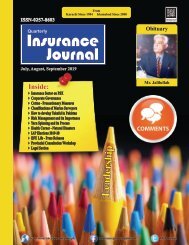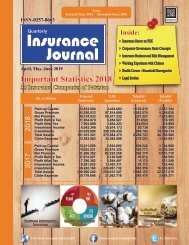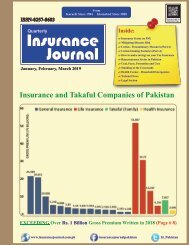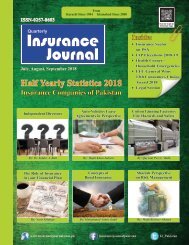Create successful ePaper yourself
Turn your PDF publications into a flip-book with our unique Google optimized e-Paper software.
Legal Section
disclose this fact.”
With this conspectus of the rule in mind,
we turn to the facts of the present appeal.
5. Among the record produced by the
appellant at the trial were the statements
made by the insured when the policy was
taken out regarding his medical
condition/history, and also the results of
his medical examination (also carried
out at that time). That examination was
by a doctor of the appellant's choice. The
section of the record titled “Life
Proposed's Personal Statement of
Health”, signed by the insured and dated
30.07.2002 contained a number of
questions, which had to be answered by
the applicant regarding his medical
condition and health status. One of those
questions (No.7) was as follows:
“Do you now or have you ever
had Small-Pox, Heart Disease, Diabetes,
High Blood Pressure, TB, Cancer,
Nervous or Psychological disorder? If so
specify with dates.”
This question was answered by
the insured I the negative, i.e., “No”.
This answer, when read with the
evidence of the aforementioned Dr.
Suliman (which showed that the insured
had a history of coronary disease and had
undergone hearth surgery) established,
learned counsel submitted, that there had
been a deliberate concealment of a
material fact known to the insured and,
hence, breach of the duty of utmost good
faith, which allowed the appellant to
avoid the contract. We have carefully
considered this submission. The record
clearly establishes that the insured did
have heart disease and had been
operated upon on account thereof. The
negative answer given to the question
was a non-disclosure of a fact that was
material. The question however remains
whether this was a fact that was not to be
deemed known to the appellant, and/or
whether it induced it to issue the policy
on the terms as stated therein.
6. The reason why the questions just
mentioned remain is because the
appellant did not merely rely on the
answers given by the insured in the
aforementioned “Life Proposed's
Personal Statement of Health.” The
insured was also thoroughly medically
examined by a doctor of its own choice.
The doctor's report, also dated
30.07.2002, gave the insured a clean
chit. In the sections relating to coronary
matters (and indeed all others) the
medical health/status of the insured was
stated to be perfectly normal. The
remarks of the examining doctor are also
pertinent. He found the insured to be:
“fit. First Class [sic].” When this
medical examination and report are
considered in the light of the evidence as
a whole, it is clear that the appellant was
induced to issue the life insurance policy
not on account of the statements made by
the latter and, as presently relevant, the
response given to question No. 7 Rather,
it was the examination by the appellant's
own medical examiner and his report
that was clearly the most important
factor, and instrumental in inducing the
appellant to go forward in the matter.
Furthermore, it is a fact so well known
that judicial notice can be taken of t that
insurers in the life insurance business do
not issue policies without a thorough
medical examination of the person
proposed to be insured, and unless the
resultant report is found satisfactory or
acceptable. This is the industry custom
and practice uniformly followed in all
cases. If therefore the medical examiner
chosen by the insurer is negligent or the
SOPs established or the examination
(again, by the insurer)are so lax as to fail
to result in a properly thorough
examination, the burden of that fault lies
on the insurer. In such a situation the
insured cannot be held to account for any
non-disclosure such as would enable the
insurer to escape liability on the policy
unless there is fraud or a fraudulent
misrepresentation. In the actual facts of
the present case, had the coronary
condition of the insured prior to 2002
been so bad as learned counsel sought to
make out before us it would certainly
have been discovered by the appellant's
own medical examiner. That he did not
do so, and gave a report that essentially
totally belied the stance subsequently
taken by the appellant in its attempt to
avoid the contract effectively puts paid
to that stance. It cannot, in our view, be
accepted and was rightly rejected by the
Tribunal and the High Court.
7. The medical reports generated and
statements made in relation to the
issuance of life insurance policies have
been given recognition in both the 1938
Act and the Ordinance. It is now
necessary to consider those provisions,
as they are also important for the
outcome of the appeal.
8. As noted above, section 75 of the
Ordinance codifies the central aspect of
the duty of utmost good faith. Section 79
contains the remedies available to an
insurer when there is, inter alia, a breach
by an insured of the duty of disclosure.
Section 80 then makes certain special
provisions for a policy of life insurance.
The 1938 Act also had a similar
provision, in section45. For ease of
reference these are set out in tabular
form:
Insurance Journal October, November, December 2021
28
Find us at: www.insurancejournal.com.pk — www.facebook.com/insurancejournalpakistan

















